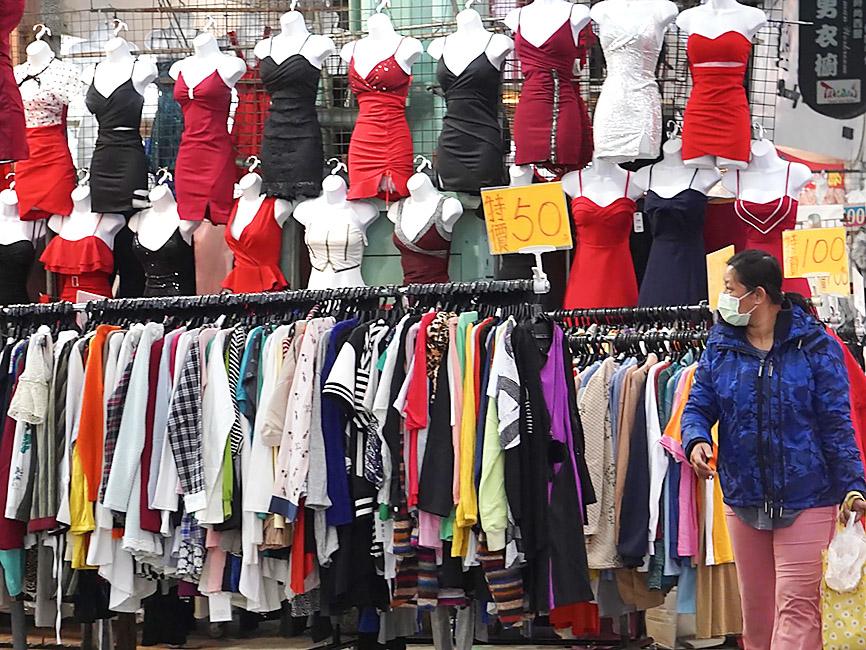The government’s business climate monitor signaled “yellow-red” for a second straight month in January, as strong demand for electronic and non-technology products ramped up business at local suppliers, the National Development Council said yesterday.
The gauge gained three points to 37, the highest in a decade, NDC research director Wu Ming-huei (吳明蕙) said, adding that the reading is only 1 point away from “overheating,” which might happen later this quarter in light of improving economic barometers.
“The demand and production fronts are gathering momentum across tech and non-tech sectors, as the economic landscape brightens at home and abroad,” Wu said.

Photo: CNA
The council uses a five-color system to portray the nation’s economic picture, with “green” indicating steady growth, “red” suggesting overheating and “blue” signaling a recession. Dual colors indicate a transition toward a recession or a boom.
Wu said that the gauge might in the next few months turn “red,” as the Directorate-General of Budget, Accounting and Statistics last month projected double-digit percentage increases for exports through the first half of this year, partly due to a low base last year.
Wu said that the “yellow-red” signal was due to frontloading demand ahead of the Lunar New Year holiday, when most Taiwanese companies took one week off.
That explained why exports and imports of electronics and machinery equipment were upgraded from “green” to “yellow-red,” the council said.
Meanwhile, revenue measures for wholesale, retail and restaurant operators turned from “yellow-red” to “red,” it said.
The positive trend is to continue as COVID-19 vaccines are more widely available, Wu said.
However, the public health crisis remains the biggest uncertainty, he added.
The index of leading indicators, which predicts the economic situation for the following six months, grew 0.78 percent to 107.07, as almost all subindices registered positive cyclical movements except the index on new construction floor space, the council said.
The US government is planning a new stimulus package of US$1.9 trillion that would help people and firms in the US affected by the pandemic and facilitate the country’s economic recovery, Wu said, adding that Taiwanese exports would likely benefit from that.
The index of coincident indicators, which reflects the current economic state, grew 1.07 percent to 105.5, as all of its seven measures increased, the council said.
Local tech firms would continue to benefit from ongoing global shortages of electronic and vehicle parts, Wu said.

Intel Corp chief executive officer Lip-Bu Tan (陳立武) is expected to meet with Taiwanese suppliers next month in conjunction with the opening of the Computex Taipei trade show, supply chain sources said on Monday. The visit, the first for Tan to Taiwan since assuming his new post last month, would be aimed at enhancing Intel’s ties with suppliers in Taiwan as he attempts to help turn around the struggling US chipmaker, the sources said. Tan is to hold a banquet to celebrate Intel’s 40-year presence in Taiwan before Computex opens on May 20 and invite dozens of Taiwanese suppliers to exchange views

Application-specific integrated circuit designer Faraday Technology Corp (智原) yesterday said that although revenue this quarter would decline 30 percent from last quarter, it retained its full-year forecast of revenue growth of 100 percent. The company attributed the quarterly drop to a slowdown in customers’ production of chips using Faraday’s advanced packaging technology. The company is still confident about its revenue growth this year, given its strong “design-win” — or the projects it won to help customers design their chips, Faraday president Steve Wang (王國雍) told an online earnings conference. “The design-win this year is better than we expected. We believe we will win

Chizuko Kimura has become the first female sushi chef in the world to win a Michelin star, fulfilling a promise she made to her dying husband to continue his legacy. The 54-year-old Japanese chef regained the Michelin star her late husband, Shunei Kimura, won three years ago for their Sushi Shunei restaurant in Paris. For Shunei Kimura, the star was a dream come true. However, the joy was short-lived. He died from cancer just three months later in June 2022. He was 65. The following year, the restaurant in the heart of Montmartre lost its star rating. Chizuko Kimura insisted that the new star is still down

While China’s leaders use their economic and political might to fight US President Donald Trump’s trade war “to the end,” its army of social media soldiers are embarking on a more humorous campaign online. Trump’s tariff blitz has seen Washington and Beijing impose eye-watering duties on imports from the other, fanning a standoff between the economic superpowers that has sparked global recession fears and sent markets into a tailspin. Trump says his policy is a response to years of being “ripped off” by other countries and aims to bring manufacturing to the US, forcing companies to employ US workers. However, China’s online warriors